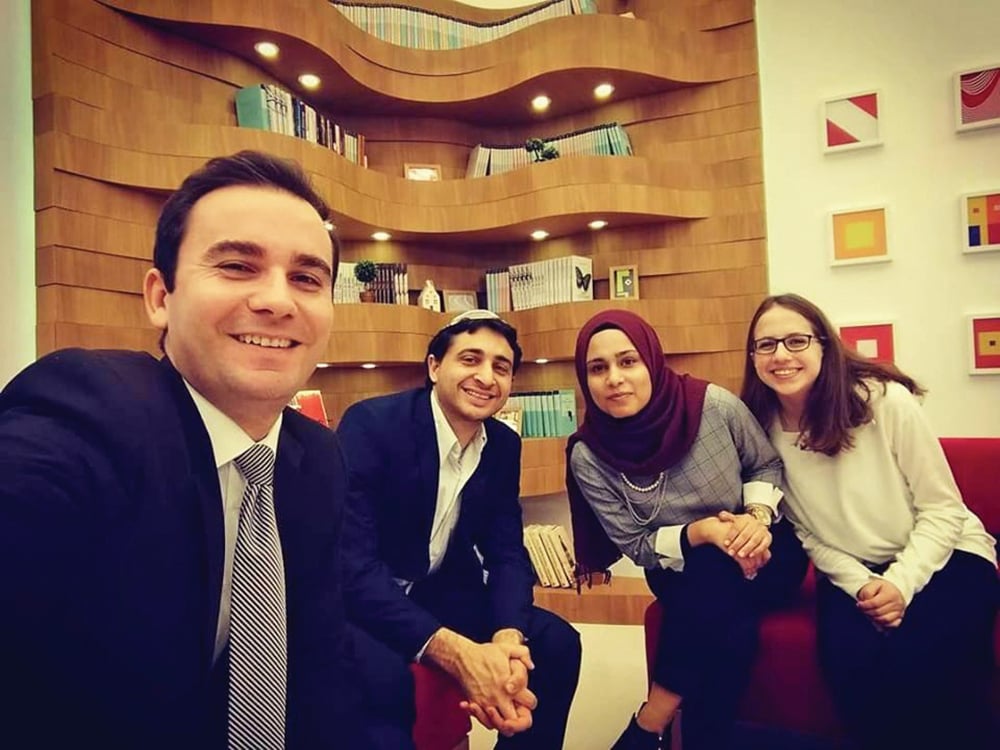
Steven Aiello has spent Shabbat in a Palestinian village, dined with Muslim leaders in the sukkah and stood under the chuppah alongside a Bedouin friend during his marriage ceremony. While relations between Arabs and Jews in Israel and the surrounding territories are complex, Aiello has spent a good part of the past decade building bridges between different groups.
Though his roots are in Brooklyn and Elizabeth, while growing up Aiello felt his mind and heart were across the Mediterranean Sea. As an undergraduate student in NYU, he headed the campus Israel club and was also involved with many Israel advocacy programs. He made aliyah in 2009. While pursuing his master’s degree in diplomacy and conflict studies from the IDC in Herzliya, Aiello joined the university’s Model United Nations club. After graduating, he continued with Model UN as a trainer for Jewish students in Petah Tikva and Arab students in the northern Israel villages of Tira and Tayibe.
Aiello could not believe that these Israeli Arab and Jewish youth who lived so close to one another and dealt with many similar struggles in the classroom had such different perspectives of their own country. After spending many hours separately with the groups, he was eager to create an opportunity for the students to hear different voices and learn about one another’s backgrounds.
In early 2012 Aiello held the first Model UN conference to bring Arab-Israeli and Jewish-Israeli youth together. The first topic he gave the students to debate was the question of recognition of a Palestinian state. He recalls that initially not one of the Arab students was able to suggest any reasons not to recognize a Palestinian state, and not one of the Jewish students was able to suggest any reasons to recognize a Palestinian state. But he pushed the youth to step outside their comfort zones and to take the position of the “other side.” At the end of the gathering, the students gave speeches and debated both sides. “They went home happy. They were proud of themselves for doing this in English and for meeting Arab and Jewish peers,” Aiello said.
The seeds were planted for what would become Debate for Peace, a nongovernmental organization Aiello formally launched in 2017 for Arab and Jewish youth to come together to debate, negotiate and try to resolve some of the most pressing challenges in international relations. He was determined to use dialogue as an avenue for Arab and Jewish youth who ordinarily would never meet one another to become familiar with other perspectives and to learn to respect views that challenged their own way of thinking.
The makeup of participants in Debate for Peace is diverse. The Jewish students come from mostly secular or traditional schools, with some representation from national religious frameworks. Non-Jewish students come from Druze, Bedouin and Arab backgrounds, including Christians and Muslims. Some Arabs join the program from Palestinian villages in the West Bank.
During its first year, Aiello ran one Model UN conference. Today he holds 12 conferences a year for some 400 students from more than 100 cities, towns and villages. The students debate in Israel and abroad and have won multiple awards for their skills. In addition to the conferences, he holds meetings in Tel Aviv multiple times each month for participants to meet with ambassadors of different countries to learn about their governments and relations with other countries, including Israel.
Some students travel multiple hours each way from the north or south of the country to attend these meetings. After each meeting, the young people often spend time together at the beach or at a cafe, where they continue to debate, but also talk about their families and what they value, and engage in typical teen conversation. “They are living in the same space but they don’t have the opportunity to meet,” Aiello said. “And then they meet and their interactions are amazing.”
Debate for Peace is composed of top students from both the Arab and Jewish sectors of Israeli society; Aiello describes them as future change-makers. He is positive that the tools these young people are learning now—including the ability to listen to diverse perspectives and to
respectfully discuss their differences, no matter how passionate they may be about their own beliefs — will be valuable to these future leaders in years ahead. While the conversations are often contentious, and tensions are high especially after the October 7 Hamas massacres and the ongoing war, there have also been moments of understanding, humanity and respect from all sides.
Aiello hopes to see one day the Israeli and Palestinian Ministries of Education making this program a mandatory part of their respective curricula. In the meantime, he is focused on the hundreds of young people that come through his program each year, and is ensuring that these future leaders have the proper tools to build bridges of peace.
For more information on Debate for Peace visit https://debateforpeace.org/blog/
Alisa Bodner is a Fair Lawn native who immigrated to Israel over a decade ago. She is a nonprofit management professional who enjoys writing in her free time.









